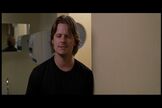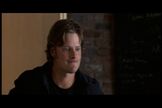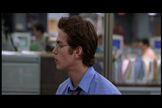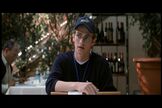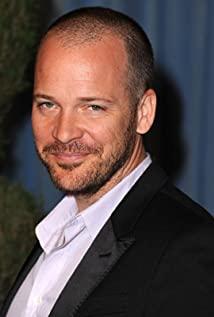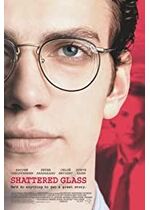-
Stephen Glass: [in Stephen's office after business hours] I don't know what you're talking about, okay? Those are all real people.
Chuck Lane: They are?
Stephen Glass: Yeah.
Chuck Lane: Look at me... and say that again.
Stephen Glass: Those are all real people.
-
Stephen Glass: [Outside the closed restaurant] I didn't do anything wrong, Chuck.
Chuck Lane: I really wish you'd stop saying that.
-
[repeated line]
Stephen Glass: Are you mad at me?
-
Stephen Glass: [sarcastically] If I were to throw a party where all we did was play "Monopoly," would you guys come?
Caitlin Avey: [jokingly] Could I be the little shoe?
Stephen Glass: Of course.
-
Adam Penenberg: [refering to the discovery that Stephen fabricated his stories] This guy is toast.
-
[after debunking Stephen Glass's New Republic article, Hack Heaven]
Adam Penenberg: But there is one thing in this story that checks out.
Kambiz Foroohar: What's that?
Adam Penenberg: [sarcastically] There does appear to be a state in the union named Nevada.
-
[repeated line]
Stephen Glass: It's in my notes.
-
Amy Brand: [talking privately] Have you noticed the way Steve's phone has been ringing lately? Did you see all those editors at the correspondence dinner? The way they were circling him?
Caitlin Avey: Is that what you want, Amy? To get a bunch of smoke blown up your ass by a pack of editors?
Amy Brand: [seriously] Yes. Yes it is.
-
Andy Fox: [to Adam] The New Republic, snobbiest rag in the business, the in-flight magazine of Air Force One... and their star goes out and gets completely snowed by a bunch of hackers. I mean, God couldn't have written this any better.
-
Michael Kelly: [talking privately] Steve, I have to ask you something. Um... did you ever cook a piece when I was your boss? Did you ever lie to me? The Young Conservatives piece... the mini-bottles? Was that true?
-
Stephen Glass: [Nervously] Chuck? Um... the, uh, thing with George Sims? That was... the voice, the voice that you heard on the telephone... that was my brother. I'm sorry. There really is a George Sims. I, I, I've spoken to him a million times. He just... stopped talking to me. You know, because of the article. He was so mad about it. I didn't know what to do and the guys from Forbes were putting so much pressure on me, you know? And you were so mad. I just thought that if I could get everybody off my back, OK, for just a day, just a day would give me enough time to go and find him. You can understand that, can't you?
Chuck Lane: You're fired, Steve.
Stephen Glass: [startled] What?
Chuck Lane: You're fired. You've lost your job.
Stephen Glass: [pleading] But you can't.
-
Caitlin Avey: [in the lobby of their office building] What the hell did you do to Steve? He called me from his car, hysterical. I asked him what was wrong, he said, "ask Chuck?"
Chuck Lane: [shouting] I fired him, okay? Not suspended, fired. Because this wasn't an isolated incident Caitlin. He cooked a dozen of them, maybe more. And we're going to have to go through them, you and I. We're going to have to go through all of them, now.
Caitlin Avey: No, the only one was Hack Heaven. He told me that himself.
Chuck Lane: If he were a stranger to you, if he was a guy you were doing a piece about, pretend that guy told you he'd only did it once. Would you take his word for it? Of course not! You'd dig and you'd bury him! And you'd feel offended if anyone told you not to.
Caitlin Avey: Every one of those pieces was fact-checked, they were all...
Chuck Lane: So was Hack Heaven!
Caitlin Avey: [pause]
Chuck Lane: You're a good reporter. You've always been such a smart and thorough reporter, why can't you be one now?
Caitlin Avey: Cause what you're telling me just is impossible, Chuck.
Chuck Lane: Go upstairs. Read 'em again.
Caitlin Avey: This is bullshit!
Chuck Lane: And make sure you go all the way back, because half of them ran when Mike was still here.
Caitlin Avey: That's what this is. Of course. I mean, what are you going to do, Chuck, pick us off, one by one? Everybody that was loyal to Mike, till you have a staff that belongs to you? Is that the kind of magazine you want to run?
Chuck Lane: Caitlin, when this thing blows, there isn't going to be a magazine anymore. If you want to make this about Mike, make it about Mike. I don't give a shit. You can resent me, you can hate me, but come Monday morning, we're all going to have to answer for what we let happen here. We're all going to have an apology to make! Jesus Christ! Don't you have any idea how much shit we're about to eat? Every competitor we ever took a shot at, they're going to pounce. And they should. Because we blew it, Caitlin. He handed us fiction after fiction and we printed them all as fact. Just because... we found him "entertaining." It's indefensible. Don't you know that?
Chuck Lane: [Chuck leaves]
-
Stephen Glass: [to Mrs. Duke's students] It's true, journalism is hard work. Everybody's under pressure, everybody's grinding to get the issue out, nobody's getting any sleep, but you are allowed to smile every once in a while.
-
Chuck Lane: [Outside the closed restaurant] It was ten people?
Stephen Glass: Yes.
Chuck Lane: For dinner?
Stephen Glass: Yes.
Chuck Lane: [Looking at the business hours sign] They're closed at 3:00 on Sundays.
Stephen Glass: Yeah, I know. I know, they almost didn't let us in. Okay? But it was a couple minutes before 3:00 and Ian looked like he was about ready to cry, and so they said okay.
Chuck Lane: But for dinner?
Stephen Glass: Go in and ask them yourself, Chuck. Okay? Go in and see if they would serve a party that came in at 2:58 and the answer would be yes, because that's when we got here.
Chuck Lane: The Forbes guys are going to have all this too...
Stephen Glass: [speaking at the same time] I didn't do anything wrong, Chuck.
Chuck Lane: ...and they're going to dig through the records of that office building. I'm sure they have surveillance cameras and they're going to check them.
Stephen Glass: I didn't do anything wrong, Chuck!
Chuck Lane: I really wish you'd stop saying that!
Chuck Lane: Steve... come on, anyone can make a mistake.
Stephen Glass: You know, this is not right, Chuck! Okay, I feel really attacked. And you're my editor. You're supposed to support me and you're taking their word against mine? You're supposed to support me!
-
Chuck Lane: [in Stephen's office after business hours] You had your brother pose as George Sims.
Stephen Glass: What?
Chuck Lane: The phony recording from Jukt Micronics? It's a Palo Alto number. And your brother is a student at Stanford. You had him pose as Sims.
Stephen Glass: No, Sims is a real guy...
Chuck Lane: Steve, Steve...
Stephen Glass: I've talked to him a million times, Chuck. My brother and I aren't even speaking right now.
Chuck Lane: Stop it. You faked Sims, you faked a website, you faked all those voicemails...
Stephen Glass: [speaking at the same time] You don't know. You don't know, Chuck.
Chuck Lane: Restil, Hiert, Ghort...
Stephen Glass: [speaking at the same time] You got this totally backward.
Chuck Lane: It's all crap. I can trace it if you make me. I'll find it all billed to you.
-
Gloria: [referring to the discovery that Stephen fabricated his stories] You know what could've prevented all this, don't you?
Chuck Lane: No, what?
Gloria: Pictures. How could you make up characters if everyone you wrote about had to be photographed?
-
Chuck Lane: [during a litigation meeting] We've read through all the pieces now, the entire staff, and we've come up with a list of those whose facts and sources we couldn't verify independently. I know you can't admit guilt of any kind but I want you to confirm a few titles for me.
Glass' Lawyer: We're not prepared to confirm or deny anything at this time.
Chuck Lane: What I'm going to do is this, I'm going to read to you a list of suspicious titles, one by one. If you raise an objection to a particular title, we'll fact check it again in the hope of removing it from the list. If you remain silent we'll assume that piece is fabricated either partially or entirely, and it'll stay on. Is that clear to everyone?
Chuck Lane: Okay.
[Chuck reads from the list]
Chuck Lane: "Hazardous To Your Mental Health."
[Stephen remains silent]
Chuck Lane: That means it stays on the list of suspicious pieces, fabricated pieces.
Glass' Lawyer: We understand, can we move along?
Chuck Lane: [Chuck continues to reads from the list] "Holy Trinity," "Probable Clause," "Don't You D.A.R.E.," "Spring Breakdown," "State of Nature," "Rock The Morons," "After The Fall"...
-
David Bach: [over the phone] Look, I'm really sorry to bother you at night but it seemed important.
Chuck Lane: It's fine, is there a problem?
David Bach: Well, I don't know. I just got off the phone with Stephen. He sounds horrible. Did you suspend him, Chuck?
Chuck Lane: David, what is the problem?
David Bach: He asked me if I would drive him out to Dulles later tonight, he said he wasn't sure he'd be safe driving by himself. I thought I should draw your attention to that.
Chuck Lane: Did he say where he was going?
David Bach: Yeah, he said he'd be staying with his family for a while. That could only be one of two places.
Chuck Lane: His parents live in Highland Park, right?
David Bach: Yeah, or his brother out in Palo Alto.
Chuck Lane: [Surprised] I'm sorry?
David Bach: His brother at Stanford.
-
Kambiz Foroohar: [Over the phone] In light of all this: how confident are you in this story of yours?
Stephen Glass: Are we off the record?
Kambiz Foroohar: If you like.
Stephen Glass: Well, off the record, some of the things that you've brought up: the website, the idea that I was always speaking to these people through voicemail, that is, that they were always calling me. It didn't seem strange before, but clearly, there are some problems with the story. You've pointed them out. One portion of it was structured in a way that - I just, well, in light of all this, I just, I'm... I'm increasingly beginning to believe that I've been duped.
-
Stephen Glass: [Narrating] So Chuck took over and the job, for the first time ever, began to feel like a job. But I'm being unfair. The truth is I wrote fourteen pieces while Chuck was editing the magazine. And the last of them was the biggest story I ever wrote.
-
Chuck Lane: [Seeing the apology letter issued the New Republic and signed by its staff] It's funny, because I thought I was going to have to explain all this to you.
[everyone applauds]
-
Stephen Glass: [Narrating] There's so many show offs in journalism, so many braggarts and jerks. They're always selling, always working the room, always trying to make themselves look hotter than they actually are. The good news is reporters like that make it easy to distinguish yourself. If you're even a little bit humble, a little self-effacing or solicitous, you stand out. So you bring a co-worker lunch if he's buried under a deadline. You remember birthdays. It's true, journalism is hard work. Everybody's under pressure, everybody's grinding to get the issue out, nobody's getting any sleep, but you are allowed to smile every once in a while. I mean, even Woodward and Bernstein went out for a burger now and then. And they won a Pulitzer. Some reporters think it's political content that makes a story memorable. I think it's the people you find. Their quirks, their flaws. What makes them funny, what makes them human. Journalism is just the art of capturing behavior. You have to know who you're writing for, and you have to know what you're good at. I record what people do. I find out what moves them, what scares them. And I write that down. That way, they're the ones telling the story. And you know what? Those kind of pieces can win Pulitzers too.
-
Mrs. Duke: [Listing Stephen's journalism experience and background to her students] Contributing writer for Harper's magazine. Contributing writer for George Magazine. Contributing writer for Rolling Stone. And, of course, associate editor of The New Republic magazine in Washington D.C. Sorry if I'm beaming but, you know, I was his journalistic muse.
Stephen Glass: [to the students of her class] It's true.
Mrs. Duke: Just 7 years ago, he was sitting...
Stephen Glass: ...right there. I'm sorry. Right there. And I was doing the exact same thing you guys are doing. Grinding out pieces and then... having horrid nightmares of Mrs. Duke and her infamous red pen.
Mrs. Duke: And see what happens when greatness is demanded of you? Now he's at The New Republic.
Stephen Glass: And now I'm at The New Republic.
-
Stephen Glass: [to the students] There are 16,800 magazines in this country. But only one calls itself the in-flight magazine of Air Force One. And that's the thrill of working at The New Republic. You're underpaid, the hours are brutal, but what you write gets read by people who matter. Presidents, lawmakers. Your work can actually influence public policy. That's... that's an amazing privilege. And a huge responsibility. I'm sorry, they don't want to hear the whole journalistic responsibility speech. Do you? You just want to know how to get your name in print, right? Sounds familiar. OK. Let me take you through the life of your typical piece, so you can see where some of the hurdles are. We'll use one I wrote last year about a bunch of young Republicans at a conservatives convention. Now, journalism is about pursuing the truth and I would never encourage you to do anything sneaky or dishonest in pursuit of a story. Such as assuming a phony identity.
[Referring to his article "Spring Breakdown"]
Stephen Glass: On a story like that, your notes are crucial. You have to record everything you see and hear. Every quote, every detail. All the way down to the mini-bottles in the fridge.
-
Chuck Lane: [Over the phone] Can we have a talk here? Just editor to editor?
Kambiz Foroohar: Sure, go ahead.
Chuck Lane: Completely off the record and really almost human being to human being?
Kambiz Foroohar: Of course.
Chuck Lane: You guys have discovered something that a troubled kid has done. But I still don't know how you plan to play it.
Kambiz Foroohar: Chuck, we're not in the business of "gotcha" journalism here. I have no interest in embarrassing you or The New Republic.
Chuck Lane: I'm not worried about me or the magazine. That's fair game. But there's a kid here who basically just plainly screwed up. Big time. His reporting was sloppy. We know that. But we're trying to handle it internally at this point. Just as you would.
Kambiz Foroohar: Listen... we're going to run something along the lines of a trick was pulled, and some very clever hackers managed to create an illusion.
Chuck Lane: I can't tell you what to print or not to print. You guys are journalists. But he could be very hurt by what you guys publish. His career.
Kambiz Foroohar: Chuck, I understand. I do. I would hope if I made the mistakes he made people would be generous with me. But this concerns the very field we cover. We have to run it. And when we do, we're gonna need a comment from you, so, given everything that's happened, how strongly are you going to stand behind this story?
Chuck Lane: [Looking at the fake business card] I'm looking into it.
-
Stephen Glass: Keene was right, Michael. I messed up. I made a huge error. I don't know what to say. If you want me to resign, I will.
Michael Kelly: I want you to tell me what happened.
Stephen Glass: They don't have mini-bars at the Omni Shoreham Hotel. I guess I just saw all those little bottles and I made an assumption, which I know we're never supposed to do. I'm really sorry. Those guys were drinking out of a rented refrigerator. A mini-fridge.
Michael Kelly: That's it?
Stephen Glass: Yeah.
Michael Kelly: The rest of the piece is solid?
Stephen Glass: Well, yeah. Of course.
Michael Kelly: Go home, Steve. Your resignation will not be required.
Stephen Glass: Really? You're not mad?
Michael Kelly: Of course not.
Stephen Glass: Do you want my notes?
Michael Kelly: Have a good night.
Stephen Glass: Thanks, Michael. Thanks for backing me.
Michael Kelly: It's what editors do.
-
Stephen Glass: [Pitching his next article] Every station on the radio is talking about it. Mike Tyson biting Evander Holyfield. And these are supposed to be news stations. So on Tuesday, I started calling a few of them, and I finally got through to one, a Bible-talk station in Kentucky. And I managed to convince the screener that I was a behavioral psychologist who specializes in human-on-human biting. I told the guy that I'd done all this extensive research on people who chomp flesh under extreme stress.
Caitlin Avey: What did they say?
Stephen Glass: They put me on the air. I took calls for 45 minutes.
-
Stephen Glass: [to the students in Mrs. Duke's class] There are good editors, there are bad editors. You'll have both. My hope for you, though, is that once, at least once, you get a truly great one. A great editor defends his writers against anyone. He stands up and fights for you. Michael Kelly was that kind of editor. He had that kind of courage. And that's what hung him.
-
Chuck Lane: We need to take a drive to Bethesda.
Stephen Glass: What for?
Chuck Lane: I want to meet Joe Hiert.
Stephen Glass: I already told you, nobody knows where he is.
Chuck Lane: Well, maybe if we go to the hotel where he met with Restil and Sims, someone will remember him and have some clue how to find him.
Stephen Glass: [speaking at the same time] Chuck, there were hundreds of people there, okay?
Chuck Lane: These Forbes guys want to come down on you.
Stephen Glass: [speaking at the same time] This is ridiculous.
Chuck Lane: They are highly suspicious about some of the material in that article. You know that.
Stephen Glass: Yeah.
Chuck Lane: But they're going to go online with their piece tomorrow.
Stephen Glass: Oh.
Chuck Lane: OK?
Stephen Glass: Yeah.
Chuck Lane: Now, Steve... Steve.
Stephen Glass: Yeah?
Chuck Lane: If we can find Hiert, I can back them off for a day or two. OK?
Stephen Glass: Ok, I'll get my notes.
Chuck Lane: OK.
Stephen Glass: [after grabbing the notes] Let's go.
Chuck Lane: All right.
-
Stephen Glass: [In his car] There's been so much pressure. I, I... Chuck, I didn't mean to get anybody in trouble.
Chuck Lane: OK. OK. You weren't at the conference.
Stephen Glass: [finally admitting he fabricated his story "Hack Heaven"] No. You know, I had a description of it from so many sources, I thought I had it solid. OK? And I wanted the piece to have an eyewitness feel to it. For color. So I said I had been there myself.
Chuck Lane: [referring to the conference call they had earlier that day] And everything we just told the Forbes guys?
Stephen Glass: I, I... I'm so sorry, Chuck. I just panicked. If you want me to say that I made it up, I will. If that'll help you, I'll say it.
Chuck Lane: I just want you to tell me the truth, Steve. Can you do that?
-
Stephen Glass: [Explaining to Chuck where the "people" in his fabricated article "sat" during their "meeting"] We were at this table. Restil sat here, his mother was on his left. Hiert... Sorry, his mother was on his right. Hiert sat there, but then Restil wanted him closer so he slid his chair over. Sims sat here. He had a lawyer next to him. I forgot the guy's name. It's in my notes. Somebody was smoking at this table, so then Restil's mother insisted that we move to one farther away. Over there.
Chuck Lane: The hacker conference was near here, right?
Stephen Glass: Yeah, the building next door.
Chuck Lane: [At the supposed conference site] I don't remember from the article. How many people did you say were at this thing?
Stephen Glass: Uh, looked like a hundred. Might have been two. It's in my notes.
Chuck Lane: [Looking around the conference hall] Two hundred people? Here?
Stephen Glass: Yeah, they moved in and out. I mean, most of them were kids.
Chuck Lane: That doesn't seem credible to me.
Stephen Glass: All I know is I was here. All of us were right here.
Security Guard: Excuse me, sir, can I help you?
Chuck Lane: Yes, you can. We're looking into a conference that was held here a couple Sundays ago. Computer hackers. Do you remember anything like that?
Security Guard: Are you sure you're in the right building, sir?
Stephen Glass: Yes, we're sure.
Chuck Lane: Why is that?
Security Guard: Building's closed on Sunday.
Stephen Glass: [Chuck sternly looks at Stephen] All I know is I was here. The conference was right here. That's why the Restils only stayed a few minutes, OK? Because it was such a dumb place to squeeze into.
-
Mrs. Duke: [Reading the titles of Glass's articles to the students in her class] "Spring Breakdown", "The Jungle", "A Fine Mess", "After the Fall", "Peddling Poppy", "Cheap Suits", "Kicked Out", "No Free Launch", "Ratted Out", "State of Nature", "Clutch Situation", "All Wet", "Plotters", "Praised be Greenspan", "Monica Sells", "Hack Heaven".
-
Lewis Estridge: [talking privately in the break room] All I'm suggesting is that there might be facets of this that you're not considering.
Chuck Lane: Why are you defending him?
Lewis Estridge: Nobody is defending him, Chuck.
Chuck Lane: Of course you're defending him.
Lewis Estridge: He's a kid.
Chuck Lane: He doctored his notes, Lew. Just consider that for a second, you know? He sat down, and he hand-wrote a bunch of phony quotes, and then he handed them in as source material for the fact-check. Doesn't that offend you?
Lewis Estridge: Of course it does.
Chuck Lane: He also lied to his editor. That's supposed to offend you, too.
Lewis Estridge: He's a confused, distraught kid, obviously, Chuck. So suspend him for a couple of months, but let's not bury him.
Chuck Lane: [Shaking his head] Suspend him.
Lewis Estridge: There are also political considerations to take into account here. The rest of the staff, the way they feel about him.
Chuck Lane: I... I already know all that.
Lewis Estridge: What I'm saying is if you fire him, some of these people will leave. I don't know if we'd still have a magazine at the end of the day.
-
Stephen Glass: I'm so dead. I mean, I'm over. Nobody's ever going to hire me again, are they? I was so sloppy trusting my sources like that... and then lying about it. And to Chuck, of all people. I mean, the one guy who's hated me all along.
Michael Kelly: [talking on the stairs inside the lobby of his office building] I'm sure that none of this is personal.
Stephen Glass: No? Chuck keeps a list in his head... everybody who's a "Michael Kelly" person. A couple of times, I said some things I shouldn't have said... about you. So now I'm on it. That's why he's so set on killing me now.
Michael Kelly: Well, I have to tell you, Steve, he's within his rights. The things you did were fireable offenses.
Stephen Glass: I know. I'm not saying that they weren't. I did some terrible, terrible things. But believe me, Michael, Chuck doesn't care about any of it. It's my loyalty to you that he's punishing me for.
-
Stephen Glass: [Speaking to Mrs. Duke's students] I'd like to pause for a moment. You can't really go into the world of journalism without first understanding how a piece gets edited at a place like TNR. This is the system that Michael Kelly brought with him from The New Yorker, a three day torture test. If your article is good, the process will only make it better. If your article is shaky, you're in for a long week. A story comes in, and it goes to a senior editor. He or she edits it on computer then calls in the writer, who makes revisions. Then the piece goes to a second editor, and the writer revises it again. Then it goes through a fact-check where every fact in the piece, every date, every title, every place or assertion is checked and verified. Then the piece goes to a copy editor where it is scrutinized once again. Then it goes to lawyers, who apply their own burdens of proof. Marty looks at it, too. He's very concerned with any kind of comment the magazine is making. Then production takes it and lays it out in columns inches and type. Then it goes back on paper, then back to the writer, back to the copy editor, back to editor number one and editor number two, back to the fact-checker, back to the writer, and back to production again. Throughout, those lawyers are reading and rereading, looking for red flags, anything that feels uncorroborated. Once they're satisfied, the pages are reprinted, and it all happens again. Every editor, the fact-checkers, they all go through it one last time. Now, most of you will start out as interns somewhere. And interns do a lot of fact-checking. So pay close attention. There is a hole in the fact-checking system. A big one. The facts in most pieces can be checked against some type of source material. If an article is on, say, Ethanol subsidies, you can check for discrepancies against the congressional record, trade publications... LexisNexis, footage from C-SPAN. But on other pieces, the only source material available are the notes provided by the reporter himself.
-
Marty Peretz: [Over the phone] I'm in a bit of an uncomfortable situation, Chuck. I thought you might be able to help me out.
Chuck Lane: Sure.
Marty Peretz: It's about Mike.
Chuck Lane: Oh.
Marty Peretz: He and I... well, it hasn't been working out for some time now, as you know. The tone of the magazine... I think it's gotten too nasty. It's strayed from the traditions that make it great. And I'm going to be making changes.
Chuck Lane: I see.
Marty Peretz: I'd like you to step in for him, Chuck. I'd like you to become editor.
Chuck Lane: Editor?
Marty Peretz: There's a catch, of course. Mike doesn't know any of this yet. It's going to be two or three days before I tell him, so it'll have to remain between us until then. Will that be a problem for you?
Chuck Lane: Marty, Mike's a friend.
Marty Peretz: I appreciate that, Chuck, but I can't remove him until I know who's going to be his replacement. For continuity's sake, so this is how it has to be.
Chuck Lane: I'm going to have to think about this. I'm going to have to discuss it with Catarina.
Marty Peretz: Oh, of course, of course. Listen...
Chuck Lane: Marty, have you thought about the impact this might have on the staff? They feel very... he's earned a lot of loyalty there.
Marty Peretz: Yes, mostly by fighting with me.
Chuck Lane: Well, the point is I haven't earned that kind of loyalty.
-
Stephen Glass: [Pitching his next article to his editor with his colleagues listening] Is anyone interested in hackers? Uh, because I met this kid named Ian Restil. Biggest computer geek of all time. He hacked his way into the database of a company called Jukt Micronics and posted naked pictures of women and the salary of every Jukt employee on Jukt's website with a note saying, "the Big, Bad, Bionic Boy has been here, baby!" The guys at Jukt decided that it would be cheaper to hire him as a security consultant than it would be to try to stop him. So they met with him last week at the hotel where the National Hackers' Conference was taking place. It was the chairman from Jukt, Restil, Restil's mother, and Restil's agent.
Caitlin Avey: No.
Stephen Glass: Yes. Hackers have agents, too. All right... I was at the table with these guys. Restil's just laying out all of his demands,
Ian Restil: [In "flashback"] I want a Miata.
Stephen Glass: "I want a trip to Disney World."
Ian Restil: I want X-Men comic book number one.
Stephen Glass: "I want a lifetime subscription to Playboy."
Ian Restil: And throw in Penthouse.
Stephen Glass: And they're complying with every single word.
Jukt Executive: Excuse me, sir, pardon me for interrupting. We can arrange more money for you, and you can buy the comic book yourself. And when you're of a more appropriate age, you can buy the car and, uh, pornographic magazines on your own.
Ian Restil: [nods at his agent] Cool.
Stephen Glass: After that, after they have the meeting, he goes back into the conference, where all these hackers have gathered. And they're treating him like he's a rock star. Then, Restil jumps up on a table, and he's like...
Ian Restil: I want a Miata!
Stephen Glass: [demonstrating] He starts gyrating his hips like this. "I want a Miata! I want my Playboys. I want a trip to Disney World."
Ian Restil: [simultaneously with Glass] Show me the money!
Stephen Glass: [simultaneously with Restil] "Show me the money! Show me the money!"
[sits down]
Stephen Glass: Turns out there are now twenty-one states considering versions of a law called the "Uniform Computer Security Act," which would criminalize immunity deals between hackers and the companies they've torched. Meanwhile, Restil's agent claims a client list of over three hundred... one of whom was once paid a million dollars and a monster truck.
-
Kambiz Foroohar: [Adam walks in on Kambiz at a urinal] Adam, can you give a man a minute?
Adam Penenberg: Oh, yeah. I'm sorry. Uh, it's just that... this New Republic piece is a fucking sieve.
[walking with Kambiz]
Adam Penenberg: I started with a check on Jukt Micronics, which is supposed to be this "major software company" in California. I went through every search engine on the web, no matches found. So I called 411, in every area code in the state, there's no listing anywhere for a company called "Jukt Micronics." I tried the California Tax Franchise Board, there's no record of taxes ever having been paid by a company called "Jukt Micronics." Tried the State Comptroller's Office, no license has ever been applied for by a company using that name. Then I called all the hackers I know, asking if any had heard of a "National Assembly of Hackers" or of a hacker by the name of "Big, Bad, Bionic Boy": nothing. I even tried Ian Restil himself. There's no listing for the kid in D.C., Virginia, Maryland. There's no record of him ever having attended a public school before. More?
Kambiz Foroohar: Please.
Adam Penenberg: Uh, this guy Joe Hiert was described in the Glass piece as being this former basketball agent, yet no one by that name has ever been registered with the NBA and none of my hackers knew of him. I even checked the names of every government...
[looks at Andy]
Andy Fox: I was just getting some coffee.
Adam Penenberg: I even checked the names of every government employee quoted in the piece against a book listing the names of every government employee in the entire United States. None of the Glass sources were listed.
-
Stephen Glass: [in front of the magazine display case] Chuck, will you please take me to the airport?
Chuck Lane: Jesus.
Stephen Glass: Please, OK? You don't have to talk to me if you don't want to. It's fine. But I can't be by myself right now. OK? I'm, uh, I'm afraid of what I'm gonna do. You know? I... I can't get there by myself.
Chuck Lane: I'm not going anywhere with you. Now, if you feel like you're a danger to yourself, you can sit down for a few minutes until you feel calm enough to go, but I am not going anywhere with you.
Stephen Glass: But... I'm afraid that I'm gonna do something, OK? Did you hear what I said?
Chuck Lane: Yeah. It's a hell of a story.
Stephen Glass: Chuck, please.
Chuck Lane: Stop pitching, Steve. It's over.
-
Adam Penenberg: [During a conference call] A few other people we can't seem to locate: Julie Farthwork, Frank Juliet, and Ian Restil's agent Joe Hiert. We called the numbers you gave us, got voicemails for all three, and the emails were sent back. "No address" or "account closed".
Stephen Glass: Really? Because I've emailed them about a million times each. Hiert's online all day long.
Adam Penenberg: Did you ever call these people and get them directly?
Stephen Glass: No. I always left messages and spoke to them when they called me back.
Adam Penenberg: And the references in the article to Nevada law enforcement officials... was Jim Ghort the only one you spoke to?
Stephen Glass: Yes.
Adam Penenberg: Do you have a phone number for him?
Stephen Glass: Yeah. Definitely.
Adam Penenberg: By the way, what was your basis for writing that Jukt was a "big-time software company"?
Stephen Glass: I didn't. That was added by the copy desk.
Adam Penenberg: And, uh, was the hacker's conference where you first met the Jukt executives?
Stephen Glass: No, that part of the article is misleading. I, uh... I was never in the Restils' home at all.
Adam Penenberg: You weren't in Restil's home with the Jukt executives?
Stephen Glass: No, I didn't mean to imply that I had been.
[later]
Stephen Glass: Sorry about that. Did the fax come through OK?
Adam Penenberg: Yes, it did. I think the address must've gotten garbled. We can't find the site.
Stephen Glass: OK. You want to read it back to me?
Adam Penenberg: Sure. You gave us "members.aol.juktn.html".
Stephen Glass: Wait. Was that an "M"?
Adam Penenberg: I'm sorry?
Stephen Glass: After Jukt, was that an "M", as in "Micronics"?
Adam Penenberg: No, it was an "N". As in "not working".
Stephen Glass: Try "M".
Kambiz Foroohar: OK.
Stephen Glass: Sorry about that. I was just rushing.
Kambiz Foroohar: Of course. But I do find myself wondering, Stephen, why would a major software company put their website where only AOL members can access it, as opposed to the entire web?
Stephen Glass: I have no idea. I don't have a website, so I don't really know that much about them. I would trust you guys to know better than me.
Kambiz Foroohar: [while looking at the fake website] OK, looks like... we have the Jukt website up now. I have to say, Stephen, this looks very suspicious to me.
-
Ian Restil: [his demands to the Jukt executives for not disclosing their company's secrets] I want a Miata. I want a trip to Disney World. I want X-Men comic book number one. I want a lifetime subscription to Playboy and throw in Penthouse.
-
[FIRST TITLE CARD]: The New Republic Magazine was first published in 1914. It has been a fixture of American political commentary ever since.
-
[FIRST TITLE CARD]: In May of 1998, its staff was comprised of 15 writer/editors.
-
[FIRST TITLE CARDS]: Their median age was 26.
-
[FIRST TITLE CARDS]: The youngest among them was Stephen Glass.
-
Last Title Card: Stephen Glass graduated from Georgetown Law School, and is now living in New York.
-
Last Title Card: In May of 2003,
[Glass]
Last Title Card: published his first novel, "The Fabulist", about an ambitious journalist who invents stories and characters in order to further his career.
-
Last Title Card: Chuck Lane now writes for the Washington Post.
-
Last Title Card: Adam Penenberg's article appeared on-line on May 10, 1998.
-
Last Title Card: It was hailed as a breakthrough for internet journalism.
-
Last Title Card: That June, The New Republic printed an apology to its readers, admitting that 27 of the 41 pieces that Stephen Glass had written for the magazine had been either partially or entirely invented.
-
Last Title Card: Michael Kelly went on to become editor of The Atlantic Monthly.
-
Last Title Card: In April of 2003, he was killed while covering Operation Iraqi Freedom.
-
Chuck Lane: [During a conference call, over the speakerphone, responding to Kambiz Foroohar's and Adam Penenberg's suspicions after seeing Stephen's fake website] How so?
Kambiz Foroohar: Quite frankly, it doesn't look like a real website. Looks like a site that was created to fool someone.
Chuck Lane: I don't know much about computers, could somebody do that?
Kambiz Foroohar: Of course.
Adam Penenberg: Very easily.
Kambiz Foroohar: So easily, in fact, it's incredible.
Stephen Glass: [after looking through his notes] Hey, do you guys still want that number for, uh, Jim Ghort? Because I just found it in my notes.
Adam Penenberg: Yeah, sure.
Stephen Glass: All right, 605-64...
Adam Penenberg: [politely interrupts him] Oh wait.
Stephen Glass: Sorry?
Adam Penenberg: [referring to the zip code] Uh... six zero five, that's not Nevada.
Stephen Glass: [realizing he's been caught lying] Oh.
Stephen Glass: [after exhaling and pretending to be looking through his notes, trying to cover up his lie] I guess I got him mixed up with another source. Uh... sorry about that one. Oh, you know what it was? Jim Ghort was actually the guy who told me about the law enforcement officials. Um... I don't know what I was thinking. I'm gonna have to...
Chuck Lane: [interrupts him] Steve. Give them the number.
Shattered Glass Quotes
Extended Reading


